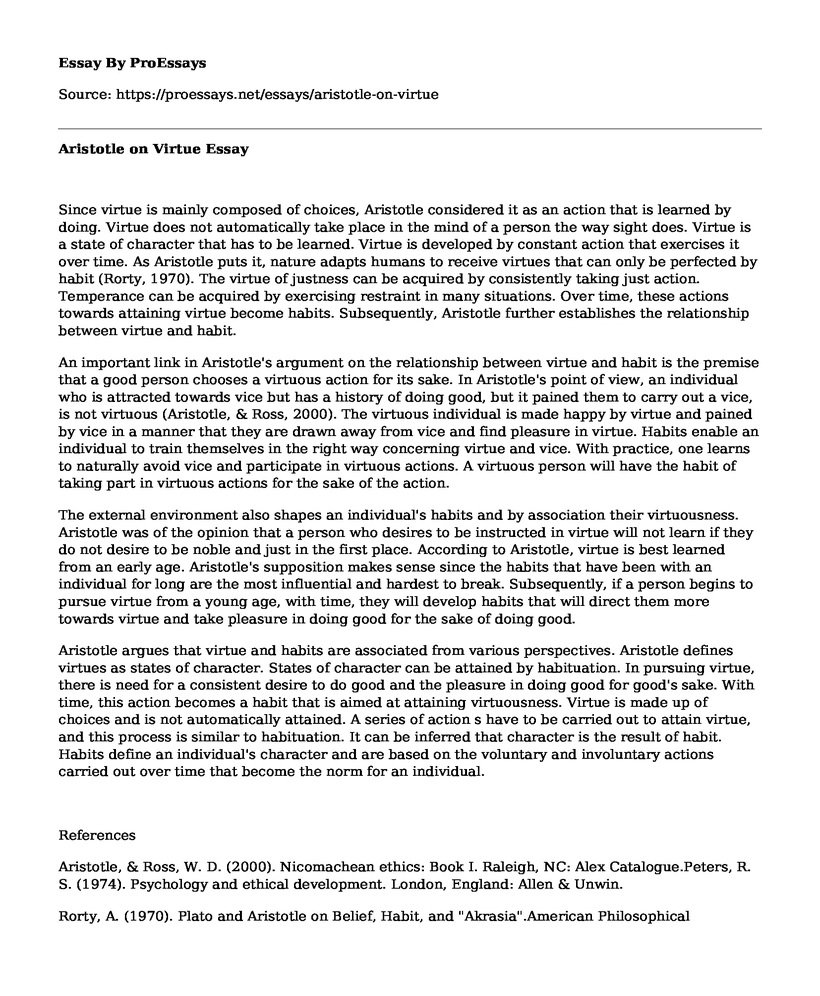Since virtue is mainly composed of choices, Aristotle considered it as an action that is learned by doing. Virtue does not automatically take place in the mind of a person the way sight does. Virtue is a state of character that has to be learned. Virtue is developed by constant action that exercises it over time. As Aristotle puts it, nature adapts humans to receive virtues that can only be perfected by habit (Rorty, 1970). The virtue of justness can be acquired by consistently taking just action. Temperance can be acquired by exercising restraint in many situations. Over time, these actions towards attaining virtue become habits. Subsequently, Aristotle further establishes the relationship between virtue and habit.
An important link in Aristotle's argument on the relationship between virtue and habit is the premise that a good person chooses a virtuous action for its sake. In Aristotle's point of view, an individual who is attracted towards vice but has a history of doing good, but it pained them to carry out a vice, is not virtuous (Aristotle, & Ross, 2000). The virtuous individual is made happy by virtue and pained by vice in a manner that they are drawn away from vice and find pleasure in virtue. Habits enable an individual to train themselves in the right way concerning virtue and vice. With practice, one learns to naturally avoid vice and participate in virtuous actions. A virtuous person will have the habit of taking part in virtuous actions for the sake of the action.
The external environment also shapes an individual's habits and by association their virtuousness. Aristotle was of the opinion that a person who desires to be instructed in virtue will not learn if they do not desire to be noble and just in the first place. According to Aristotle, virtue is best learned from an early age. Aristotle's supposition makes sense since the habits that have been with an individual for long are the most influential and hardest to break. Subsequently, if a person begins to pursue virtue from a young age, with time, they will develop habits that will direct them more towards virtue and take pleasure in doing good for the sake of doing good.
Aristotle argues that virtue and habits are associated from various perspectives. Aristotle defines virtues as states of character. States of character can be attained by habituation. In pursuing virtue, there is need for a consistent desire to do good and the pleasure in doing good for good's sake. With time, this action becomes a habit that is aimed at attaining virtuousness. Virtue is made up of choices and is not automatically attained. A series of action s have to be carried out to attain virtue, and this process is similar to habituation. It can be inferred that character is the result of habit. Habits define an individual's character and are based on the voluntary and involuntary actions carried out over time that become the norm for an individual.
References
Aristotle, & Ross, W. D. (2000). Nicomachean ethics: Book I. Raleigh, NC: Alex Catalogue.Peters, R. S. (1974). Psychology and ethical development. London, England: Allen & Unwin.
Rorty, A. (1970). Plato and Aristotle on Belief, Habit, and "Akrasia".American Philosophical
Quarterly, 7(1), 50-61.
Sherman, N. (1997). Making a necessity of virtue: Aristotle and Kant on virtue. Cambridge, England: Cambridge University Press.
Cite this page
Aristotle on Virtue. (2021, Mar 09). Retrieved from https://proessays.net/essays/aristotle-on-virtue
If you are the original author of this essay and no longer wish to have it published on the ProEssays website, please click below to request its removal:
- Philosophy Essay Example: What Life Means
- Digital Media Ethics and Technology on Climate Change Essay
- Argumentative Essay on Work Ethic in Millennials
- Nursing and Matters of Spirituality and Meaning of Life Paper Example
- Leadership and Ethical Decision Making Essay Example
- Nietzsche in Vienna: Yalom's Splendid Subject - Essay Sample
- Essay Sample on IRB: Safeguarding Human Research Participants







